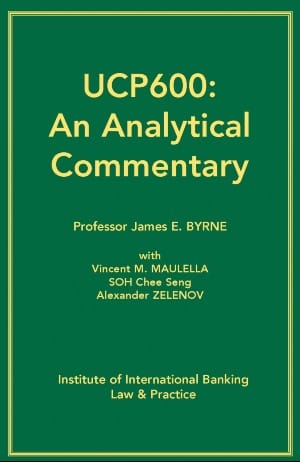Should "Negotiation" Continue to be a Form of Availability within UCP?
In the first of his series of DCW articles on major issues surrounding potential revision of UCP, ICC Banking Commission Senior Technical Advisor Dave Meynell examines the concept of negotiation.

Although not evident in all markets, it is clear that some confusion still surrounds the concept of negotiation. However, the basics are simple and easily understandable.
Definition
As defined in UCP 600 Article 2, negotiation is “the purchase by the nominated bank of drafts (drawn on a bank other than the nominated bank) and/or documents under a complying presentation, by advancing or agreeing to advance funds to the beneficiary on or before the banking day on which reimbursement is due to the nominated bank.”
Under this definition, it is important to note that a draft is not essential for negotiation to occur and that, under documentary credits, documents alone can be negotiated.
One reason that this definition was introduced in the 2007 revision of UCP was in order to clarify previous misunderstanding from many practitioners that merely forwarding documents also constituted negotiation.
Practice
In accordance with the content of UCP 600 Article 15, and as a result of a complying presentation, a beneficiary can expect to receive settlement from one of three sources:
- from the issuing bank;
- from a confirming bank that honours or negotiates in accordance with its advice of confirmation; or
- from a nominated bank that has agreed to act on its nomination to honour or negotiate.
Negotiation responsibility in respect of a complying presentation for banks entails:
- Issuing bank - this type of availability is not applicable to an issuing bank. An issuing bank is the nominator (issuer), not the nominee (nominated bank).
- Confirming bank - must negotiate by advancing or agreeing to advance funds to the beneficiary without recourse.
- Nominated bank - no obligation to negotiate. In the event such a bank agrees to act on its nomination, it will advance or agree to advance funds to the beneficiary either with or without recourse.
Calls for Removal
Despite an estimation that between 65-75% of all credits are made available by negotiation, removal of this option from the UCP as a form of availability is an argument that has been brought forward on numerous occasions.[[1]]
However, due to the wide usage of the term, removal from the UCP is not a practical solution and, in any event, would not prevent documentary credits from being issued that are available in such a way. On the contrary, removal would actually create uncertainty as to its application based on the fact that financial institutions would create their own specific interpretations that suit their needs.
Treatment of negotiation within UCP ensures a common understanding and provides uniformity in practice. As with any element of UCP, UCP definitions have the impact of obtaining harmonisation as opposed to differing customs. Although some banks in certain regions may not be supportive of the practice of negotiation, it cannot be disputed that negotiation is used extensively and that removal would be entirely detrimental to practice.
UCP 600
It has always been the intention that ICC rules should reflect existing customs and practice. Negotiation, in many parts of the world, is a prime product with a number of supporting finance tools.
It is vital that UCP’s unique characteristic of global acceptance is maintained and suggestions for non-optional changes that only benefit particular business interests or geographic segments of the user base are opposed.
The appropriate way forward is to provide guidance on this issue.

The Definitive Guide to UCP600
Exhaustive rule-by-rule handbook with analysis for sound drafting
UCP Revision
Whilst at present not supported, re-defining negotiation is a consideration that could be addressed in a future revision of UCP 600.
A viable practical restatement of the definition was proposed in “UCP600: An Analytical Commentary” (2010) by Professor Jim Byrne:
“Negotiation” means the transfer to a nominated person of the right to the proceeds of a drawing on a documentary credit.
Alternatively, I would suggest the definition could be expanded for clarification:
Negotiation is the act by which a nominated bank, under a credit available by negotiation, advances funds or agrees to advance funds to the beneficiary against a complying presentation of documents, prior to receiving reimbursement from the issuing bank. This advance or agreement to advance funds occurs on or before the banking day on which reimbursement is due to the nominated bank. Negotiation does not involve the purchase of drafts and/or documents, but rather the provision of financing based on the nominated bank's assessment of the complying presentation and the issuing bank's obligation to reimburse.
This alternative definition removes the concept of “purchase” of drafts and/or documents, bearing in mind that UCP provides no definition of the actual meaning of “purchase”.
It also eliminates reference to drafts drawn on banks other than the nominated bank, which supports the aim of the ICC to promote drafts becoming less common in practice. In essence, it emphasises the financing aspect of negotiation, which is the core function in modern trade finance, clarifying that negotiation is an act of the nominated bank, distinguishing it from other forms of availability.
Usefully, it maintains the timing aspect (on or before the banking day on which reimbursement is due) to preserve the risk management element for nominated banks.
And, most importantly, it explicitly states that negotiation is based on a complying presentation, reinforcing the importance of document compliance.
[[1]]: See also: “Negotiation: A Common Understanding Still Eludes Us”, SOH Chin Aik, Sep 2018 DCW 20; Negotiation under UCP600: Should a Purchased Transport Document Count as a Document of Title?” HEI Zuqing, Feb 2015 DCW 30; “Back to the Basics: Honour, Negotiation, and Reimbursement of Letters of Credit” Tat Yeen YAP, Mar 2022 DCW 25.











